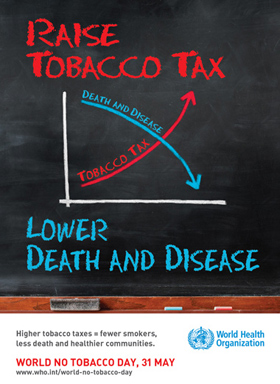
News
World No Tobacco Day 2014
In South Africa, more than 43 000 people die every year from diseases related to tobacco smoke. Tobacco products such as cigarettes contain nicotine, which is highly addictive. Tobacco use is one of the main risk factors for a number of chronic diseases, including cancer, lung diseases and cardiovascular diseases. On World No Tobacco Day 2014, make your health a priority and quit smoking.
World No Tobacco Day 2014
World No Tobacco Day is celebrated every year on 31 May. The national theme for this year is Raise Taxes on Tobacco as the World Health Organization (WHO) and its partners call on countries to raise tobacco taxes. Research shows that higher taxes are especially effective in reducing tobacco use among lower-income groups and in preventing young people from starting to smoke.
Further studies have shown that increasing excise taxes on tobacco is considered to be the most cost-effective tobacco control measure. The ultimate goal of World No Tobacco Day is to contribute to protecting present and future generations from the devastating health consequences due to tobacco use and exposure to tobacco smoke.
What are the Health Issues Related to Smoking Addictions?
Smoking increases the risk of kidney, bladder, cervical and pancreatic cancer. In addition, smokers face a higher risk of suffering from heart attacks than non-smokers and smoking contributes to chronic lung diseases like emphysema and bronchitis.
According to the WHO, cigarette smoking harms nearly every organ in the body. Cigarettes contain carbon monoxide, which slows the blood's ability to carry oxygen to body tissues, including vital organs.
What are the Short-Term Effects of Smoking?
- Nicotine addiction, respiratory problems, coronary artery disease, dental problems, nervousness, depression and a tendency toward health-damaging behaviour.
- Carbon monoxide decreases the amount of oxygen in the blood, creating an imbalance in the demand for oxygen by the cells.
- Most obvious physical effects involve bad breath, wrinkled skin and stained fingernails.
What are the Long-Term Effects of Smoking?
- Over time, smoking increases the risk of developing problems such as heart disease, stroke, haemorrhage, emphysema, osteoporosis and many different types of cancer.
- Smoking greatly increases a woman's chances of infertility, complications during pregnancy and the early onset of menopause.
- Smoking has also been linked to sudden infant death syndrome (SIDS) and mental disability in babies of women who smoke.
- Smoking increases a person's risk of infections like bronchitis and pneumonia.
What is Second-hand Smoke?
Second-hand smoke, or environmental tobacco smoke, occurs when non-smokers breathe in other people's tobacco smoke. The WHO states that second-hand smoke is responsible for 600 000 premature deaths per year. Children exposed to second-hand smoke are more likely to suffer from asthma, ear infections, pneumonia and bronchitis.
What Can I Do About Second-Hand Smoke?
- Make your home, workplace and community smoke-free.
- Ask smokers not to smoke around you.
- Don't allow smokers to smoke around your children.
- Ask visitors not to smoke in your home.
- If you live with smokers, set up a place outside where they can smoke or help them quit.
- While the consequence of smoking may seem far-off, they should be taken seriously. The WHO states that tobacco use is responsible for more than six million deaths every year, which is more than HIV/AIDS, tuberculosis and malaria combined.
What are the Health Benefits if I Stop Smoking?
- Within 20 minutes your heart rate and blood pressure will drop, and in 12 hours the carbon monoxide level in your blood drops to normal.
- Your circulation improves and your lung function increases within two to 12 weeks.
- Coughing and shortness of breath decreases within one to nine months, and your risk of coronary heart disease decreases.
- Your stroke risk is reduced to that of a non-smoker within five to 15 years.
- Your risk of lung cancer and cancer of the mouth, throat, oesophagus, bladder, cervix and pancreas decreases within 10 years.
- Decreases the excess risk of many diseases related to second-hand smoke in children, such as respiratory diseases (asthma) and ear infections.
- Healthy, full-term pregnancies and increased fertility.
Contact:
Smokenders
Tel: 021 788 9120
E-mail: info@smokenders.co.za
CANSA
Tel: 0800 22 66 22 (toll-free)
Cape Metro CANSA Care Centre
Tel: 021 689 5347
E-mail: info@cansa.org.za
Harmony Addictions Clinic
Tel: 021 790 7779
E-mail: steven@harmonyclinic.co.za
Stop Smoking Easily
Tel: 0861 115 153
E-mail: info@stopsmokingeasily.co.za
Source: World Health Organization


